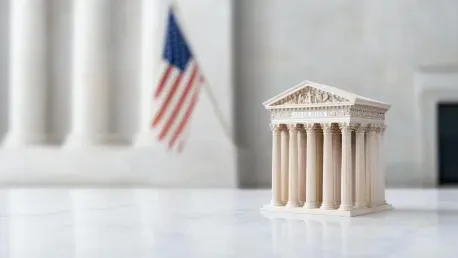In an unfolding legal saga captivating political and constitutional scholars alike, the United States Supreme Court is preparing to tackle the contentious issue of birthright citizenship. At the core of the debate is former President Donald Trump’s executive order from January in a recent year, which sought to effectively strip birthright citizenship from individuals born to undocumented immigrants and temporary visa holders on American soil. This executive measure, aimed at counteracting what many in the Trump administration viewed as an immigration loophole, challenges the principles embedded in the 14th Amendment. Critics argue that the proposed changes contradict the Constitution’s explicit provision that grants citizenship to any individual born or naturalized in the United States.
The Supreme Court’s Unusual Timing and Complexities
Emphasis on the Historical Context of Nationwide Injunctions
Nationwide injunctions have surfaced as key players in debates surrounding the executive order, with the Supreme Court’s upcoming hearing representing a pivotal moment. Historically, these legal instruments have allowed judges to halt federal policies beyond the litigants involved, influencing nationwide legal applications. The spotlight on the Supreme Court arises not just due to the injunctions’ potential impact but because hearings this late in its term are rare, especially concerning such complex matters. Critics of nationwide injunctions maintain that individual district judges wield excessive power, bypassing broader judicial consensus. Proponents, conversely, consider these injunctions critical to moderating executive reach and maintaining a balance of power. This hearing offers an opportunity to understand the justices’ stances on this complex legal tool, illuminating the future trajectory of nationwide injunctions.
Exploring Executive Power and Immigration Dynamics
The Trump administration’s immigration strategy, pushing the envelope of executive authority, has repeatedly attracted judicial scrutiny and intervention. As a microcosm of broader immigration policy debates, the Supreme Court hearing encapsulates significant questions about the scope of executive power. Immigration reform is inextricably linked with the constitutional balance of power, as the executive branch tests its boundaries amidst robust judicial oversight. In the face of executive measures possibly overstepping legal frameworks, the judiciary steps in to interpret and maintain constitutional integrity. As a result, this legal engagement showcases ongoing discourse around the tensions and synergies between different government branches and provides insights into how immigration laws adapt under varying executive directives.
Implications for Citizenship and Government Powers
Legal and Constitutional Dimensions of Citizenship
The proposed changes to birthright citizenship raise profound constitutional questions, especially around the 14th Amendment, which has historically served as a bedrock for citizenship rights. Emerging unscathed through decades of civil rights evolution, this amendment unequivocally defines citizenship parameters. However, introducing potential exceptions raises alarms, as it may undermine years of judicial precedent. Legal analysts and scholars caution against such interventions, suggesting a risk to both individual rights and established legal doctrines that have long guided American citizenship norms. As multiple federal courts challenge the executive order’s legal standing, the scenario highlights a national unease about altering such foundational aspects of citizenship without substantial legislative and judicial examination.
Broader Impacts on U.S. Immigration Policy
The Supreme Court’s deliberations not only stand to impact birthright citizenship but also ripple across other facets of U.S. immigration policies. As the case unfolds, its outcomes could redefine not only immediate citizenship questions but also broader immigration strategies and policies. With immigration reform consistently featuring at the forefront of political discourse, this hearing underscores potential shifts in policy direction. Additionally, experiences in dealing with this case may influence how future administrations approach executive orders related to immigration, as a court’s decision could shine a light on permissible scopes and checks. Hence, while the current hearing primarily speaks to citizenship issues, its ramifications may extend far beyond, shaping future immigration governance trajectories.
Balancing Rights and Enforcement
Safeguarding Constitutional Rights
Central to the discourse remains a delicate balance between safeguarding constitutional rights and enforcing immigration laws, presenting a dichotomy at the heart of broader immigration policy discussions. Debates focus on maintaining individual liberties as enshrined by the Constitution while allowing legitimate enforcement of immigration statutes. The intricate push-and-pull dynamic underscores the need for nuanced policy crafting, avoiding overreach by any governmental branch. This legal challenge embodies broader societal questions about ensuring rights without compromising national security and enforcement goals. Through this lens, the executive order’s opposition not only represents immediate disputes but also catalyzes a broader reevaluation of the constitutional principles shaping citizenship.
Future Considerations and Judicial Role
As the Supreme Court takes on these matters, focus shifts to the judicial branch’s crucial role in interpreting constitutional adherence. This division of government must balance executive ambitions with constitutional obligations to ensure legal and ethical principles guide governmental actions. The hearing’s outcomes could serve as a template for tackling future legal challenges, solidifying precedents that clarify current legal uncertainties. As a result, the case not only weighs immediate repercussions but also shapes future strategies for navigating the complex intersection of rights, governance, and law.
Ultimately, the ongoing Supreme Court hearing marks a pivotal moment in American jurisprudence, intertwining legal, political, and societal aspects of birthright citizenship and nationwide injunctions. As justices ponder the issues, implications extend beyond an executive order’s details, touching broader critiques of executive power and immigration policy. As discussions progress, this hearing symbolizes a vital scrutiny of contemporary challenges in U.S. governance, framing future legal and policy directions.









